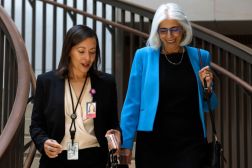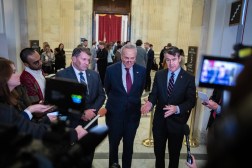White House: U.S. wants to be at the forefront of automation policy

The Obama administration wants the U.S. to be a world leader in economic and defense policy related to a new wave of automation powered by machine learning and artificial intelligence, White House Chief of Staff Denis McDonough said Tuesday.
“We can return to these questions in a way that America can kind of set the space and then set the parameters for how we go about it,” McDonough said during a White House conversation on the topic that he moderated.
The conversation comes as the White House looks to wrap up its string of workshops on artificial intelligence Thursday.
In May, the White House Office of Science and Technology Policy announced plans to explore the uses and risks of AI. Since then the office has hosted three workshops and another event on the matter. The conversation Tuesday previewed the last of the four workshops, slated for Thursday in New York City and titled “The Social and Economic Implications of Artificial Intelligence Technologies in the Near-Term.”
Increased automation could mean a significant loss in lower-and-middle class jobs, experts said Tuesday, contributing to even more inequality.
An example: Jobs that earn less than $20-an-hour have a 83-percent chance of automation, according to the 2016 Economic Report of the President.
The two speakers in the conversation — Robin Chase, co-founder of Zipcar, and Martin Ford, author of the book “Rise of the Robots: Technology and the Threat of a Jobless Future” — said policymakers should explore establishing a universal basic income to combat the potential impact of jobs lost due to automation.
The rate at which the industry is changing, Chase said, means the effects of AI-powered automation could play out in five-to-10 years, not 50.
“We need to start thinking about universal basic income,” Chase said. “Meaning, you would have a small amount of money you would have every month so that you would be protected against this incredibly dynamic work.”
Finland is considering implementing a universal basic income, McDonough said. But he added that he thinks existing programs in the U.S. could be improved for maximum, unencumbered impact at a faster rate than trying to implement something similar.
In addition to addressing economic concerns surrounding automation, he also said weaponizing automation is one of the administration’s concerns.
“We are looking, through the Department of Defense, at how we can use artificial intelligence — machine-learning — to increase our defenses,” McDonough said. “But we are also very clear-eyed about making sure that there’s an appropriate human interaction in any kind of weaponization of any of this artificial intelligence.”
He added that maybe “arms control arrangements and negotiations” would be needed to take some capabilities “off the table.”
“This I think we can be a world leader in, and we’re designing our policy to be a world leader, on establishing a code of conduct or a set of understandings,” McDonough said.
[Read more: White House seeks public input on artificial intelligence]
OSTP also submitted a request for information last week to learn “how America can best prepare for the future of AI, including information about AI research and the tools, technologies, and scientific training that are needed,” U.S. Deputy CTO Ed Felten wrote in an OSTP blog post.
The deadline for responses to the RFI is July 22, and comments can be submitted via the web form.






